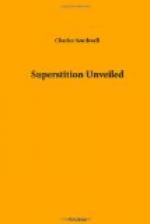There ever has been something. Here, again, is a point of unity. All are equally assured there ever has been something. Something is, something must always have been, cry the religious, and the cry is echoed by the irreligious. This last dogma, like the first, admits not of being evidenced. As nothing is inconceivable, we cannot even imagine a time when there was nothing. Universalists say, something ever was, which something is matter. Theists say, something has been from all eternity, which something is not matter but God. They boldly affirm that matter began to be. They affirm its creation from nothing, by a something, which was before the universe. Indeed, the notion of universal creation involves first, that of universal annihilation, and secondly, that of something prior to everything. What creates everything must be before everything, in the same way that he who manufactures a watch must exist before the watch. As already remarked, Universalists agree with Theists, that something ever has been, but the point of difference lies here. The Universalist says, matter is the eternal something, and asks proof of its beginning to be. The Theist insists that matter is not the eternal something, but that God is; and when pushed for an account of what he means by God, he coolly answers, a Being, having nothing in common with anything, who nevertheless, by his Almighty will, created everything. It may without injustice be affirmed, that the sincerest and strongest believers in this mysterious Deity are often tormented by doubts, and, if candid, must own they believe in the existence of many things with a feeling much closer allied to certainty than they do in the reality of their ‘Great First Cause, least understood.’ No man’s faith in the inconceivable is ever half so strong as his belief in the visible and tangible.




